
Our expert shares science-based and myth-busting insights on how UV rays can affect your skin, regardless of your skin tone.
While soaking up the rays on a beach or hike can give us a boost of vitamin D and have a positive effect on our mood, too much can lead to premature skin ageing and increase the risk of developing skin cancer. Vancouver Coastal Health Research Institute (VCHRI) researcher Dr. Sunil Kalia details why we should all be sun-smart.
Q: I’ve heard that UVA and UVB radiation are both damaging for skin, but in what ways?
A: UVB rays make up only five per cent of UV radiation from the sun, but they are strongly linked with sunburns and skin cancer. This is because of the intensity of the highly energetic photons they emit, which can break the bonds that connect DNA molecules in skin. On the other hand, UVA constitutes 95 per cent of the UV radiation from the sun and is largely linked with skin ageing, such as dark spots and wrinkling. Because of its longer wavelengths, UVA rays can penetrate into deeper layers of skin and damage collagen. They can also cause skin cancer by stimulating the production of skin-damaging reactive oxygen species chemicals.
Q: How much time in the sun is okay for getting a healthy dose of vitamin D?
A: It depends on the time of the day and the season. During the fall, winter and early spring in British Columbia, you cannot obtain adequate levels of vitamin D from the sun, even after several hours of exposure. During July and August, five to 15 minutes of sun exposure could be sufficient to get all the vitamin D you need. However, research has found that, due to the inability to acquire adequate vitamin D levels with sun exposure during the majority of the year and increased skin cancer risks with UV radiation, it is better to get the recommended amount of vitamin D through oral supplementation or foods that are high in vitamin D.
Q: How much sun exposure should I get based on my skin type and colour?
A: People with all skin types and colours should minimize their sun exposure to reduce their skin cancer risk, especially when UV radiation levels are highest during the summer months between the hours of 11 a.m. and 3 p.m.
Q: What are a few simple steps that I can take to protect my skin from the sun?
A: It is recommended to seek shade when possible and cover your skin with clothing, such as a hat, long sleeves, pants, sunscreen and wide UV 400 sunglasses that protect the full eye. Choose a broad-spectrum sunscreen with UVA and UVB protection and a sun protection factor (SPF) greater than 30.
Q: How does SPF protection work?
A: The SPF rating refers to how much solar radiation the sunblock is either reflecting or absorbing — UV-absorbing chemicals in sunscreen break down and release radiation as heat. An SPF of 15 deflects around 93 per cent of the sun’s radiation, while an SPF of 30 deflects around 97 per cent.
There is no sunscreen that can deflect 100 per cent of UVA and UVB rays, and all need to be reapplied regularly to remain effective, especially when exposed to sweat or water. Retain the effectiveness of your sunscreen by keeping it at around room temperature and away from direct sunlight.
Q: What are some of the most common myths about sun protection?
- While coconut oil does have some natural UV-blocking properties, it has not been vigorously tested and is not protective enough to prevent skin damage.
- Citrus fruits have been found to contain antioxidant properties, but no clinical studies have shown this to be effective at preventing the development of skin cancer from UV exposure.
- Building up a base tan before going on a vacation somewhere hot or before the summer season hits is not recommended because the process of building up a base tan — either through tanning beds or outdoor sun exposure — involves damaging your skin and possibly causing skin cancer. Having naturally darker skin, such as olive, black or brown skin tones, does seem to reduce the risk of developing skin cancer by a factor of between 100 to 1,000. However, the harmful effects of sun exposure can exacerbate the premature ageing of the skin as well as skin conditions, such as melasma, which causes disfiguring freckle-like patches or blemishes.
Q: What online resources can I consult for more sun safety information?
A: The CDA podcast, Dermalogues, features a sun awareness episode in which I answer questions about sun safety and awareness. The CDA and BC Cancer websites are other great resources for information about how to protect your skin and prevent or detect skin cancer.



